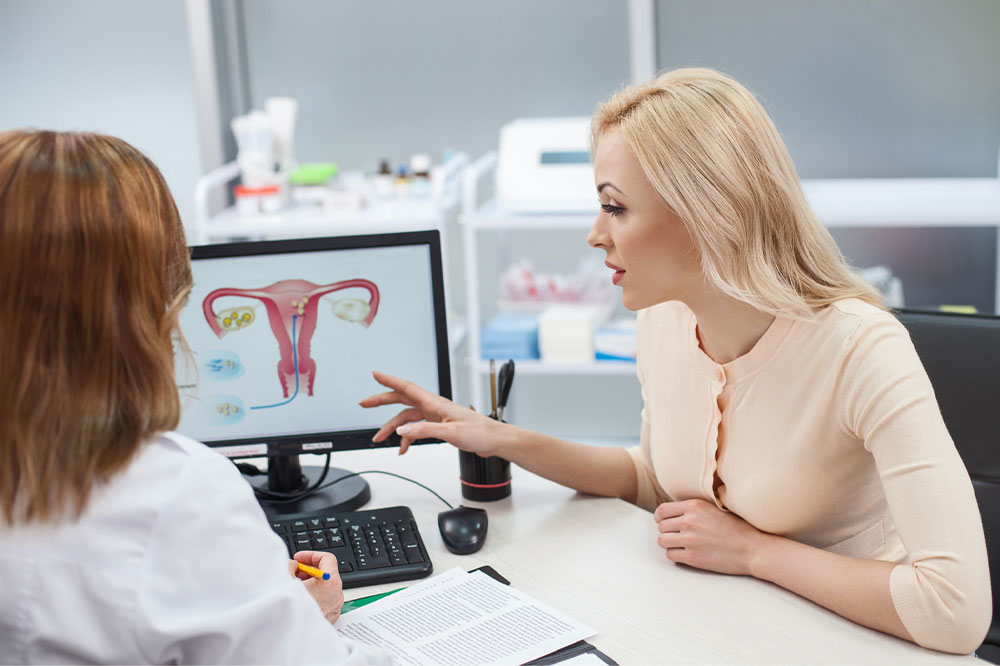
11 uncomfortable questions to ask a gynecologist
Visiting a gynecologist involves discussing intimate aspects of one’s health and body, which can lead to feelings of unease or embarrassment. But it’s crucial to remember that a gynecologist is a medical professional dedicated to patients’ well-being and is there to provide guidance and support. It’s important to ask certain unusual questions to ensure one receives the best care possible. Here are some of the uncomfortable questions one might be too embarrassed to ask their gynecologist:
Why is sexual intercourse painful?
Insufficient vaginal lubrication, yeast or bacterial infections, vaginismus, wherein the muscles of one’s vagina involuntarily contract, pelvic muscle injury, fibroids, muscle spasms, ovarian cysts, childbirth trauma, and other reasons can contribute to one’s experience of painful intercourse. Discussing the details of one’s experience with a doctor can lead to a proper diagnosis and treatment for one’s problem.
Why is it hard to orgasm?
Many physical and psychological factors contribute to one’s difficulty achieving orgasm. Some of these reasons include thyroid issues, low oxytocin levels, low libido, dehydration, hormonal deficiencies, lifestyle factors like a lack of exercise, or injuries or surgeries that affect nerves connected to the genital area. Similarly, mental stress or anxiety, a history of sexual trauma, a lack of emotional intimacy, mood disorders like depression, or sociocultural beliefs may influence an individual’s attitude and affect their sexual desire, intimacy, and pleasure.
How should one perform a breast self-exam?
A breast self-exam is vital for detecting changes in one’s breast tissue. A gynecologist can guide you on self-exams, mammograms, and what changes warrant medical attention. Performing a breast self-exam every month is usually recommended, ideally at the age of 20. The examination is to check for any lumps, hard knots, dimples, discharge, pain, discomfort in the underarms or around the breast area, changes in one’s nipples, or any other size, shape, or color distortions. Early detection of abnormalities can lead to timely treatment and better outcomes.
How can one maintain good vaginal health?
A gynecologist can advise on maintaining proper hygiene, avoiding irritants, and making lifestyle choices that promote vaginal health. It’s best to avoid scented products, as they can disrupt the natural pH balance and lead to irritation or infections. One can opt for gentle, unscented cleansers instead. Regularly changing tampons or pads and avoiding douching are advised during menstruation. Wearing breathable cotton underwear and avoiding tight-fitting clothes can help keep the vaginal area dry and reduce the risk of infections. Additionally, practicing safe sex and regular STI screenings, staying hydrated, managing stress, getting enough sleep, and eating healthy meals rich in probiotics can promote a healthy vaginal microbiome.
Can one visit a gynecologist during periods?
In most cases, one can visit a gynecologist during one’s period. That said, check before you make an appointment because certain test results can be affected due to menstrual bleeding. For instance, a pap smear test is best rescheduled during menstruation since the high red blood cell count may alter the results. In most cases, however, gynecologists are accustomed to dealing with various situations and can still perform necessary examinations and answer one’s questions.
Is it normal to have a vaginal discharge?
Vaginal discharge is a natural bodily function that cleans and protects the vagina. However, color, consistency, or odor changes might indicate an infection that needs medical attention. One should not hesitate to ask one’s gynecologist about what’s normal and when to be concerned.
How can one manage menstrual pain and PMS?
Many women experience discomfort during their periods. Inquiring about strategies to alleviate menstrual pain and manage Premenstrual Symptoms (PMS) can significantly improve quality of life.
Is it normal to feel itchy down there?
It is common to feel occasional itching in the genital area, which various factors can cause. Yeast Infections and an imbalance in vaginal bacteria can result in itching, soreness, a fishy odor, or unusual discharge. Similarly, hormone fluctuations, such as during menstruation or menopause, or skin conditions like eczema or psoriasis, may lead to itching and irritation. Sometimes, it may be a reaction to certain soaps, detergents, fabrics, or personal care products. One can visit a doctor to understand why one is uncomfortable, fix one’s lifestyle, or get proper treatment.
Are there any changes one should expect during menopause?
If one is approaching or experiencing menopause, discussing the physical and emotional changes associated with this life stage can help one navigate it more easily. Menopause brings about various physical and emotional changes, including hot flashes, mood swings, and changes in libido. A gynecologist can recommend personalized strategies to manage the changes more effortlessly.
How does one know if they have STIs?
Sexually Transmitted Infections (STIs), also known as sexually transmitted diseases (STDs), can often present with various symptoms, but some infections might not show any symptoms. One is advised to get tested for STIs even if there are no symptoms if one suspects being exposed to an STI. Common signs include itchiness, soreness, bumps or inflammation in the genital area, pain during urination or intercourse, or unusual discharge. STIs can sometimes cause changes in menstrual patterns or unusual bleeding between periods. One may experience overall body symptoms like skin rashes, jaundice, night sweats or chills, or fever.
What screenings and exams does one need?
Regular screenings, such as pap smears and pelvic exams, are crucial for detecting potential issues early. One can ask one’s gynecologist about the recommended schedule for these tests based on age and health history.
Fostering open and honest discussions regarding one’s sexual function, needs, and concerns can pave the way for a more enriching and satisfying intimate life while promoting overall well-being. Therefore, rather than avoiding or shying away from addressing any questions or issues that may arise, embracing these conversations is crucial to ensuring physical and emotional health.


